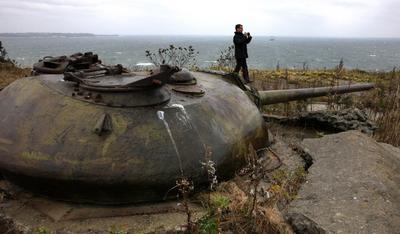And what is the true significance of this present falling out?
Answers lie in the changes that have swept over the region over the last two decades since the fall of the Soviet Union, and the shift in perceptions that has taken place between Russia and Japan over that time.
In the 1990s, the cash-starved Russian Federation looked to Japan for investment, technology and partnership in its energy projects in the region. Its willingness to try to reach some compromise over the issue was pushed by those in Moscow who saw real dividends in trying to reach some compromise with Tokyo over the Islands. In 1998, Boris Yeltsin was promised a US$1.5 billion aid package from Japan and the IMF and while both sides dismissed any links to the territorial dispute, Prime Minister Keizo Obuchi visited Moscow that same year to try to negotiate a deal on the Kurils. Some further $3.7 billion has also flowed into Russian energy projects from the Japanese Bank of International Cooperation, Mitsui, and the Mitsubishi Corporation.
So what has changed? Well, Moscow no longer sees dividends in trying to reach a compromise with Tokyo. It realises it can gain more by taking a hard line on the issue — building up militarily and sending a revolving door of politicians from Moscow — and gain points domestically, among the electorate and its conservative military.
With next year’s presidential elections in mind, Russian President Dimitry Medvedev’s December visit to the islands — the first by a Russian leader — was also calibrated to appeal to nationalist sentiment and to reassure Russian security fears in the Far East. Sporting a bomber jacket (in Putin mode), Medvedev delivered tough talk on Japanese claims, and promised aid and development money to Russian local leaders.
Furthermore, a spat with Japan, coming so soon after China’s own territorial-driven fishing boat incident in September, puts Moscow in Beijing’s good books; games which Moscow knows it can play without paying a political price, safe in the knowledge that Tokyo has little recourse and will always come back to the table later.
While Russia may have grown stronger, Tokyo is in a far weaker position than it was two decades ago. Its economy has been in the doldrums for most this time, with the Chinese juggernaut brushing past earlier this year. While Japan remains one of the largest global creditors it has huge budget deficit problems, which have led to a loss in its creditworthiness. It has also suffered a large number of leadership changes, churning through five PMs in five years, and impairing its ability to get a serious grasp of long-term policy issues like security and the economy. Last week, as Prime Minister Kan’s cabinet struggled to formulate answers to Japan’s economic woes, it also had to deal with a sideline leadership battle, which saw 16 lawmakers — affiliated with rogue DPJ member Ichiro Ozawa — challenge the PM’s leadership, and threaten to impair his ability to pass legislation.
Japan’s relationship with its security guarantor, the US, has also been on less-than-sure footing since former Prime Minister Hatoyama threatened to scupper a base-relocation agreement in Okinawa. While his mishandling of the issue (among others) ultimately caused the Japanese electorate to lose their confidence in his leadership, the Futenma base issue strengthened the Russian perception of an isolated Japan.
The question is: will the diplomatic furore around the Kuril Islands/Northern Territories continue past Russian elections next year?
That depends on whether Moscow is serious about building up its Far East military command, which is now in serious disrepair. Promises to endow the command with S400 SAM (surface-to-air missile) systems, a Mistral assault vessel as well as a modern fighter wing have followed the restarting of Russian bomber patrols.
As the Asia Pacific develops into one of the biggest drivers of the global economy, it is not surprising that Russia is reorienting itself to this source of economic growth. Its relationships with the US, NATO and the EU are fairly stable at present, meaning that it can afford to focus less on its Western borders.
But if Russia does continue to militarise the islands further it could cause a Japanese response two or three years down the road. Ultimately, while Russia appears to hold the strong cards in this particular game, Moscow knows that it cannot afford to lose Tokyo entirely on this issue. Japan remains a significant economic power in the region, and more importantly – in Russia’s view – an effective balancer to growing Chinese influence. Given these calculations, neither side is likely to close the Kuril issue completely.
John Hemmings is a research analyst and Coordinator for the International Security Studies Department at the Royal United Services Institute, London and Fellow at the Pacific Forum, Center for Strategic and International Studies, Washington, DC.

